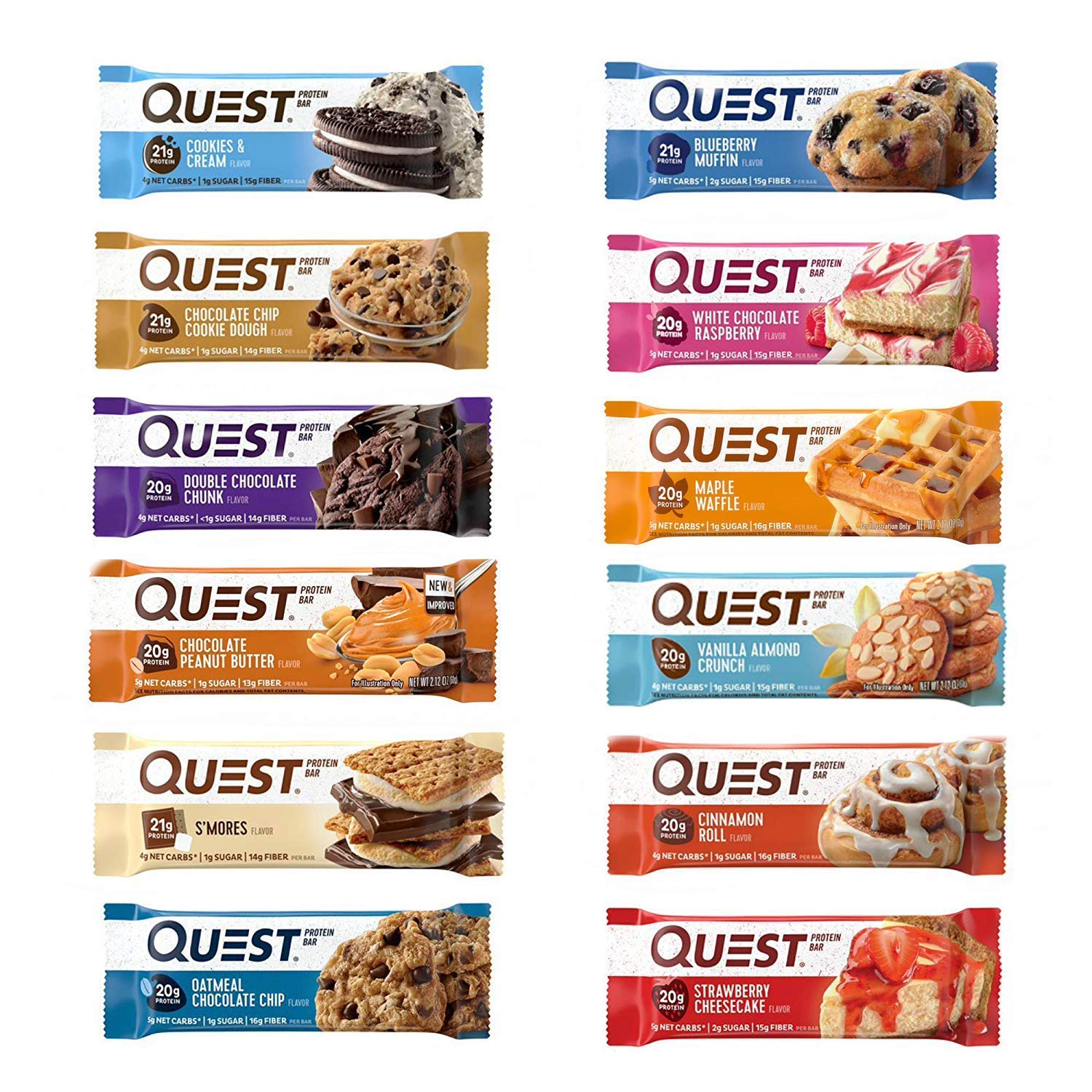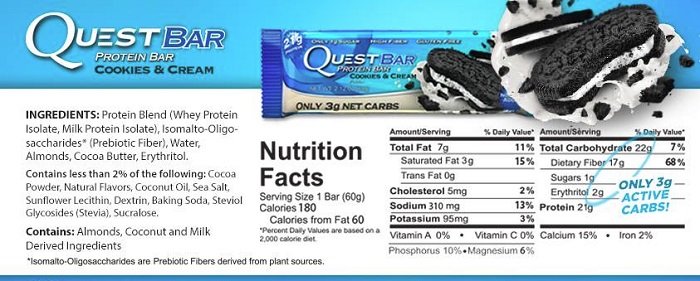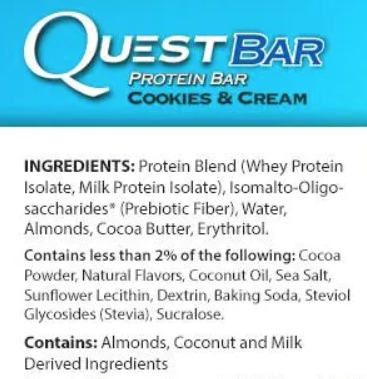People have been asking and we're here to answer: Can Quest bars cause diarrhea?
There have been numerous postings online from people who claim to have experienced diarrhea as a result of eating the highly popular, protein packed, Quest bars.
After doing a Google search you will come across posts like this, which probably isn't too settling...

But is it actually the Quest bar itself that is causing such unwanted frequent, and often loud, bathroom visits?
And if so, why is this happening?
Quest Bar Nutrition
Quest Nutrition, the company behind it all, was recently acquired the US food giant Simply Good Foods. They started out in 2010 with protein bars devised from one of the co-founders' wife's recipe, whom was working as a fitness trainer.
They make a variety of different health products nowadays ranging from Quest Protein Shakes to Quest Protein Chips, but the Quest Protein Bars are still some of the most popular.
There are dozens of different flavors of Quest Protein Bars and because of this their nutrition will vary. Cookies & Cream, Blueberry Muffin, Chocolate Chip Cookie Dough, S'Mores, Chocolate Peanut Butter, etc...

But for the sake of simplicity, lets take a look at the popular Cookies & Cream flavor....

*Note: Nutrition facts may vary slightly as Quest tinkers with their formulation.
The nutrition facts here remain fairly steady among the flavors. What you can typically expect is:
- Total Fat: 6 - 9g
- Total Carbs: 20 - 25g (most of which is fiber)
- Protein: 20 - 21g
But these numbers really don't tell you much of anything. What you have to look at is the list of ingredients and where some of these numbers might be coming from.

Of these ingredients there are some that stand out as possible problems. These include Protein Blend, Fiber, Almonds, Erythritol, and sucralose, which brings us to 5 reasons Quest bars could be causing you to spend more time on the toilet.
5 Reasons It Could Give You "Explosive Diarrhea"

1) High Fiber Content
Quest bars are high in fiber, usually containing anywhere from 13g to 17g per bar.
The daily recommended intake is 25 - 30g, which means that one single bar is already providing about 50% of your daily need. So if you already get enough fiber from other foods in your diet then this could certainly result in excess.
Fiber can be both good and bad for diarrhea. Generally speaking, too much insoluble fiber is a common cause. This type of fiber is not soluble in water and goes through the digestive system unscathed. It adds bulk to stool and can increase transit time, helping to "flush your system".
We know that Quest Protein Bars contain the insoluble, prebiotic fiber Isomalto-Oligosaccharides (IMO for short) from the ingredient list, which is actually marketed as a sweetener usually because of it's sweet flavor. This fiber provides food for good gut bacteria and can absorb water helping to prevent diarrhea... but we don't know how much of the fiber content this makes up.
2) Artificial Sweeteners
Not every flavor Quest Protein Bar contains sucralose, but most do.
Sucralose, aka Splenda, is an artificial sweetener that has 0 calories and is a massive 600 times sweeter than sugar. However, the downside is that it is artificial and, although approved by the FDA, does bring some side effects such as bloating, gas, and diarrhea.
The reason sucralose/Splenda causes gas and diarrhea is thought to be due to the fact that about 85% isn't absorbed (source: Food Insight) during digestion and some is fed on by gut bacteria, which produce nitrogen gas in return.
It's also worth noting that Splenda kills good gut bacteria, something found in more than one study.
3) Sugar Alcohols
Nearly all flavors of these protein bars contain a sugar alcohol called Erythritol, which is used as a sweetener and is neither a sugar or alcohol, contrary to what the name might suggest.
Erythritol is found naturally in grapes, watermelon, peaches, and other fruits... and is a low-calories substitute for sugar.
Being that it's natural is good and all, but it has been found to give some people headaches, stomachaches, and diarrhea.
This is also caused by incomplete digestion and then later fermentation by gut bacteria in the intestines, just like sucralose.
In one study published in the Journal of Nutrition Science and Vitaminology erythritol was given to 55 adults at increasing dosages to see how much people can handle before getting diarrhea. The dose at which erythritol is safe stops at around 0.46g/kg of BW for men and 0.68g/kg of BW for women, meaning that a 155 pound person can handle about 32 - 48 grams.
This is a heck of a lot, but when coupled with other potential causes, such as sucralose, the amount needed is likely less.
4) Lactose Intolerance
About 65% of the population is lactose intolerant, but this statistic, while true, doesn't paint a very clear picture because the rates of this intolerance very greatly in different parts of the world.
Lactose is a sugar found in milk, or milk products... and Quest bars have Milk Protein Isolate and Whey Protein Isolate, both of which can have lactose at varying levels.
People who are lactose intolerant lack the enzyme needed to digest this sugar and this is what causes diarrhea, bloating, stomach pain, gas, etc.
5) Protein Allergies and Intolerance
There is also a chance that diarrhea could stem from an allergic reaction, which more than one ingredient on the list could lead to.
Milk allergy is extremely common in young children with about 3% of people under 4 years of age being affected. Most people grow out of this allergy, but some still may have the problem into adulthood.
The problem here is much different from that of lactose intolerance, as it involves the immune system. What happens is your body sees one or more of the proteins in milk as a threat and the immune system responds accordingly, although there is no real threat. It is basically a false alarm that beings about symptoms of illness.
As we know, these protein bars do contain milk protein.
The almonds that are often in the list of ingredients could also cause an allergic reaction leading to diarrhea--and obviously peanuts could be a potential cause of allergic reactions if you are eating any of the peanut butter flavored Quest bars.
Almond allergies make up about 9 - 15% of all tree nut allergies in the US (source: Journal of Asthma and Allergy) and peanut allergies affect about 1.2% of the entire US population (source: AJMC).
If either of these are the causes of diarrhea then the affected individual will notice symptoms consuming other milk-derived products and/or almonds/peanuts.
The Easy, Often Effective, Solution

If you really, really want to eat Quest Protein Bars but get diarrhea from them, there may be an easy solution.
Maybe you bought an entire box of them and don't want to waste your money, or maybe you just really like the taste... but your gut doesn't. The reason doesn't matter.
The easy and free solution is to simply eat them more slowly. If the diarrhea from eating these bars is stemming from there being an overload of fiber, the artificial sweeteners, sugar alcohols, or even lactose intolerance, then just slowing down the consumption rate could do the trick. This will give your body more time to handle less of whatever the problem may be.
So limit yourself to 1 bar at a time, and if this has been giving you problems then consume that 1 bar slower. If this doesn't seem to help then you may also want to incorporate more foods that help prevent diarrhea into your diet.
*If you are allergic then this likely won't help.
The Takeaway
Overall Quest Protein Bars are a fairly health choice when it comes to the protein bar market. They contain mostly natural ingredients and can be a lifesaver when you are in a rush but need to get your dose of protein packed nutrition to stay in shape and build muscle.
But just because they are generally healthy doesn't mean they won't give you diarrhea. This is a fairly common side effect potentially caused by a number of things, the high amount of fiber likely being the most prevalent... which can often be remedied by simply slowing down Quest Protein Bar consumption.
Now it's your turn: What has your experience been eating Quest Protein Bars?


I had explosive diarrhea from Quest Peppermint Bark. It hurt.